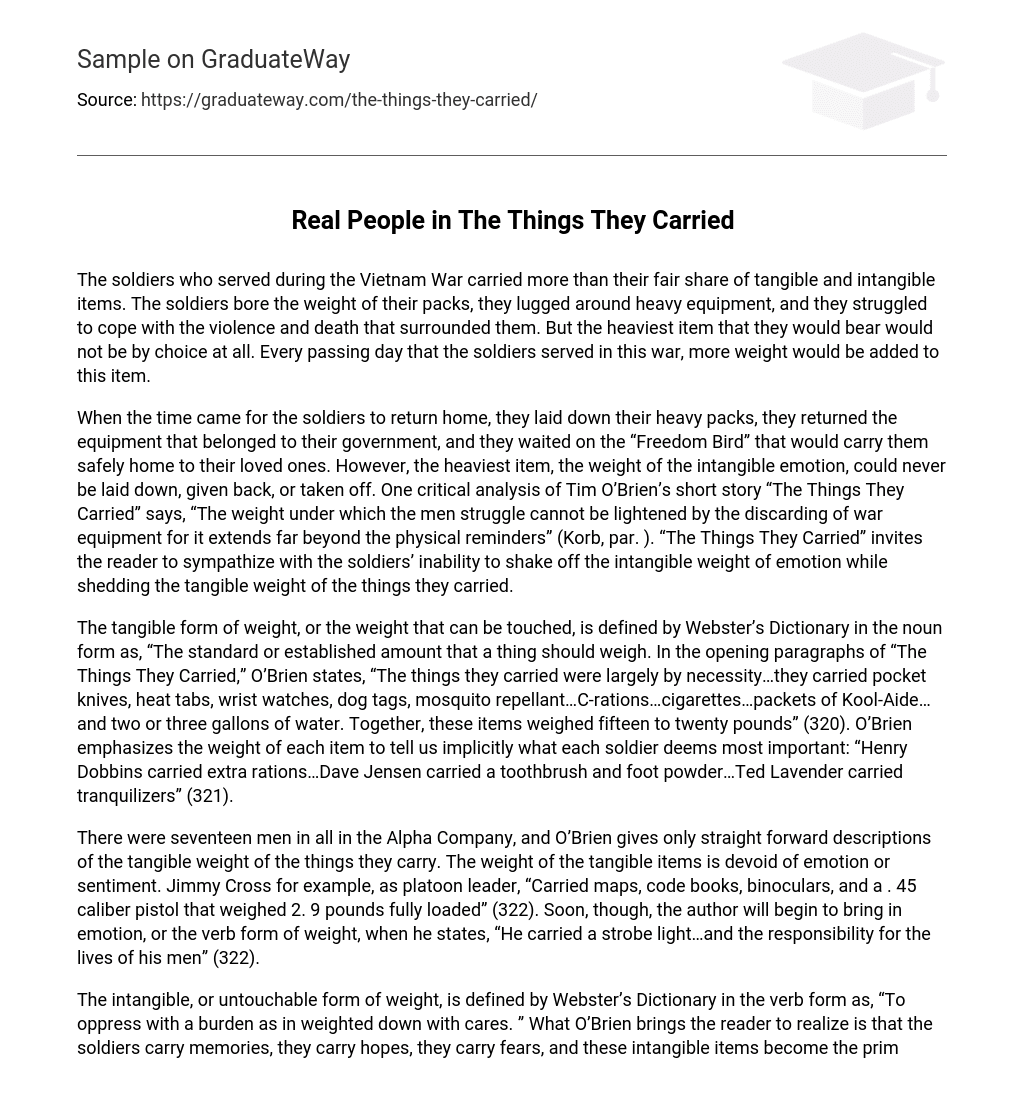The soldiers who served during the Vietnam War carried more than their fair share of tangible and intangible items. The soldiers bore the weight of their packs, they lugged around heavy equipment, and they struggled to cope with the violence and death that surrounded them. But the heaviest item that they would bear would not be by choice at all. Every passing day that the soldiers served in this war, more weight would be added to this item.
When the time came for the soldiers to return home, they laid down their heavy packs, they returned the equipment that belonged to their government, and they waited on the “Freedom Bird” that would carry them safely home to their loved ones. However, the heaviest item, the weight of the intangible emotion, could never be laid down, given back, or taken off. One critical analysis of Tim O’Brien’s short story “The Things They Carried” says, “The weight under which the men struggle cannot be lightened by the discarding of war equipment for it extends far beyond the physical reminders” (Korb, par. ). “The Things They Carried” invites the reader to sympathize with the soldiers’ inability to shake off the intangible weight of emotion while shedding the tangible weight of the things they carried.
The tangible form of weight, or the weight that can be touched, is defined by Webster’s Dictionary in the noun form as, “The standard or established amount that a thing should weigh. In the opening paragraphs of “The Things They Carried,” O’Brien states, “The things they carried were largely by necessity…they carried pocket knives, heat tabs, wrist watches, dog tags, mosquito repellant…C-rations…cigarettes…packets of Kool-Aide… and two or three gallons of water. Together, these items weighed fifteen to twenty pounds” (320). O’Brien emphasizes the weight of each item to tell us implicitly what each soldier deems most important: “Henry Dobbins carried extra rations…Dave Jensen carried a toothbrush and foot powder…Ted Lavender carried tranquilizers” (321).
There were seventeen men in all in the Alpha Company, and O’Brien gives only straight forward descriptions of the tangible weight of the things they carry. The weight of the tangible items is devoid of emotion or sentiment. Jimmy Cross for example, as platoon leader, “Carried maps, code books, binoculars, and a . 45 caliber pistol that weighed 2. 9 pounds fully loaded” (322). Soon, though, the author will begin to bring in emotion, or the verb form of weight, when he states, “He carried a strobe light…and the responsibility for the lives of his men” (322).
The intangible, or untouchable form of weight, is defined by Webster’s Dictionary in the verb form as, “To oppress with a burden as in weighted down with cares. ” What O’Brien brings the reader to realize is that the soldiers carry memories, they carry hopes, they carry fears, and these intangible items become the primary focus of the story. The weight of these intangible items is as real as any physical items, and unlike the physical objects, these items are not so easily cast away. When describing the burdens of the intangible weight, the writing is more in tune with the emotions of the characters.
O’Brien states, “Lieutenant Jimmy Cross humped his love for Martha up the hills and through the swamps” (321). Lieutenant Cross’s love for Martha was intangible; he could not touch that love. This usage of the verb form of weight brings on a more sentimental tone and adds a great deal of emotional weight for the reader. This contrast between noun and verb forms of weight give the emphasis that is necessary between the weight of the tangible and intangible items that the soldiers carried. The tangible loads that the men carry seem to be physical burdens that serve to take their minds off the weightier issues, such as their own mortality.
The death of Ted Lavender, for example, is a weight that is heaviest for Jimmy Cross. One overview states, “In order to deal with the death, the men make jokes in order to stay sane. They try to remain tough, and in the end, the heaviest weight they carry is the emotional baggage of men who might die…This is the heaviest weight because this is the one they can never put down” (Overview, par. 8). Eventually, it becomes apparent that the things they carry are not things at all. O’Brien says, “They carried grief, terror, love, longing – these were intangibles, but the intangibles had their own mass and specific gravity” (331).
It is in reading passages like these that the reader begins to sympathize with the soldiers who seem like ourselves, real people, with real faces, who carry intangible emotion with a very real weight. In “The Things They Carried,” the reader is taken through two very different forms of weight: the weight that is the standard amount that something should weigh and the weight of the oppression of being burdened down with cares. This story tells us of items that were humped through the jungles of Vietnam, but the reader also feels the emotional baggage that lies heavy in the heart of every soldier who fought in the war.
What O’Brien wants the reader to recognize is that the tangible weight, the weight that one can hold, touch, and feel, is nothing compared to the weight of the intangible emotion of a heart heavy burdened with the oppression of war.
Works Cited
Korb, Rena. “The Things They Carried. ” Short Stories for Students. Detroit: Gale, 2002. Literature Resource Center. Web. 17 Nov. 2010. O’Brien, Tim. “The Things They Carried. ” The River Reader. New York: Pearson, 2010. 320- 334. Print. “Overview: ‘The Things They Carried. ’” Gale Online Encyclopedia. Detroit: Gale, 2010. Literature Resource Center. Web. 17 Nov. 2010.





